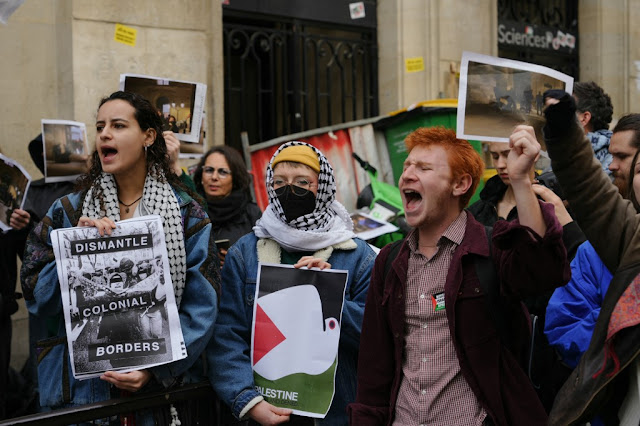British Prime Minister Rishi Sunak promised on Monday to start sending asylum seekers to Rwanda after parliament passed much-delayed legislation to facilitate the deportation of those arriving in Britain without permission. The plan however is deemed risky and rejected by a large array of human rights actors.
Melissa Chemam
Britain's Prime Minister Rishi Sunak welcomes Rwandan President Paul Kagame
outside 10 Downing Street in London, Britain, on 9 April 2024.
Official figures put 2022 annual net migration to Britain at a record of 745,000, and Sunak has set out a series of measures to cut legal migration by 300,000.
Figures show more than 80,000 asylum applications remain to be decided.
Now that the bill has passed into law, the government wants to start detaining asylum seekers, before scheduling deportation from the month of July.
How the plan came about
The scheme was first agreed in April 2022 by then Prime Minister Boris Johnson, to send anyone who arrived in Britain illegally to Rwanda, some 6,400 km away.
However, the first deportation flight in June 2022 was blocked by the European Court of Human Rights (ECHR).
The UK Supreme Court then upheld a ruling and said that the scheme was unlawful because migrants were at risk of being sent back to their homelands or to other countries where they would be at risk of mistreatment.
The new conservative leader Rishi Sunak made his pledge to "stop the boats" one of his top five priorities, as soon as he became prime minister in late 2022.
Britain is spending more than 3 billion pounds a year on processing asylum applications, he insisted, with the cost of housing migrants awaiting a decision in hotels and other accommodation running at about 8 million pounds a day.
Taking back control of Britain's borders and ending the free movement of people into the country was a major factor that led to the 2016 vote for Britain to leave the European Union.
Polls show it remains one of the most important issues for British voters.
How the plan would work
Sunak promised on Monday to start sending asylum seekers to Rwanda within 10 to 12 weeks.
He said an airfield was on standby, slots were booked for flights, 500 staff were ready to escort migrants and courts had been reserved to process appeals.
The deportation would concern those arriving in Britain without permission, from any country.
The UK Home secretary James Cleverly, on a visit in Lampedusa in Italy on Thursday, said the UK intends to deport asylum seekers to Rwanda “indefinitely”.
No deportation has been taking place yet, but Britain has already paid Rwanda more than 200 million pounds.
To resettle some 300 refugees could cost more than 600 million pounds.
The National Audit Office said in a report the scheme could surpass £580m by 2030.
Some 50,000 people could potentially be sent to Rwanda, but it remains unclear how many people the country can actually take.
Rwandan President Paul Kagame said he is "pleased" by the move, his government's spokeswoman said on 23 April 2024.
In Kigali, the Hope Hostel is getting ready to welcome the first migrants from the UK.
Yet the move will most likely trigger further legal challenges by charities, campaigners and unions who argue that Rwanda is not a safe destination.
And the ECHR could again issue orders to block deportation flights.
Strong risks
Many UN agencies warned that the plan threatened the rule of law and set "a perilous precedent globally".
They urged the UK to instead "take practical measures to address irregular flows of refugees and migrants, based on international cooperation and respect for international human rights law".
The human rights watchdog of the Council of Europe, which Britain is still a member of, has condemned Sunak’s Rwanda scheme, saying it raises 'major issues about the human rights of asylum seekers and the rule of law.'"
The Refugee council published an analysis on Thursday showing the scheme is causing a system meltdown and will leave 100,000 people in limbo.
Even if the UK government was successful in flying 2,000 people to Rwanda by the end of year, a further 115,575 asylum seekers would be left stranded in the UK, the report states.
Even in Rwanda, major doubts have emerged.
One of the rare opponents to President Paul Kagame, Victoire Ingabire Umuhoza, told me that she thinks the deal equates to "modern slavery"...
(More on this tomorrow on RFI English)
'Expensive way to be cruel'
In the UK, the Green Party totally opposes the bill. It is “an incredibly expensive way to be cruel”, the co-leader Carla Denyer said.
Sending refugees to Rwanda, or anywhere else, will never be an effective solution, also warns International Rescue Committee (IRC).
"Rather than outsourcing its responsibilities under international law, we urge the government to abandon this misguided plan and instead focus on delivering a more humane and orderly immigration system at home," Denisa Delić, Director of Advocacy, at IRC UK, said.
"This includes scaling up safe routes, such as resettlement and family reunion, and upholding the right to seek asylum," she added. "Sending refugees to Rwanda, or anywhere else, will never be an effective solution.”
"It is a dark day in the United Kingdom," Human Rights Watch responded in a report. "This will have a devastating impact on human rights and the rule of law, risking the lives of people who came to the UK seeking safety and setting a dangerous global precedent."
The Care4Calais charity has previously challenged the policy and said it would work tirelessly to block any flights, seeking to reassure migrants in Britain.
"They can be assured that Care4Calais will not only stand in solidarity with them, we are absolutely committed to fighting for their safety here in the UK," their head Steve Smith said in a statement.







